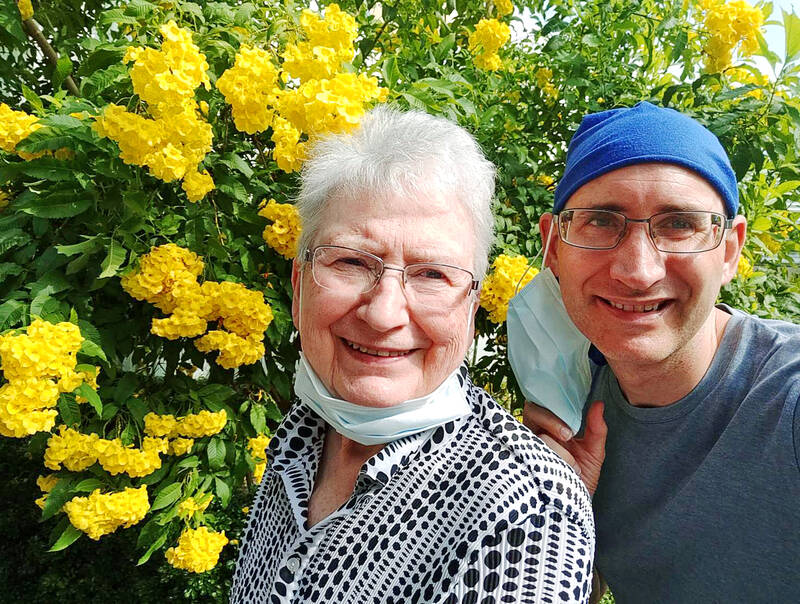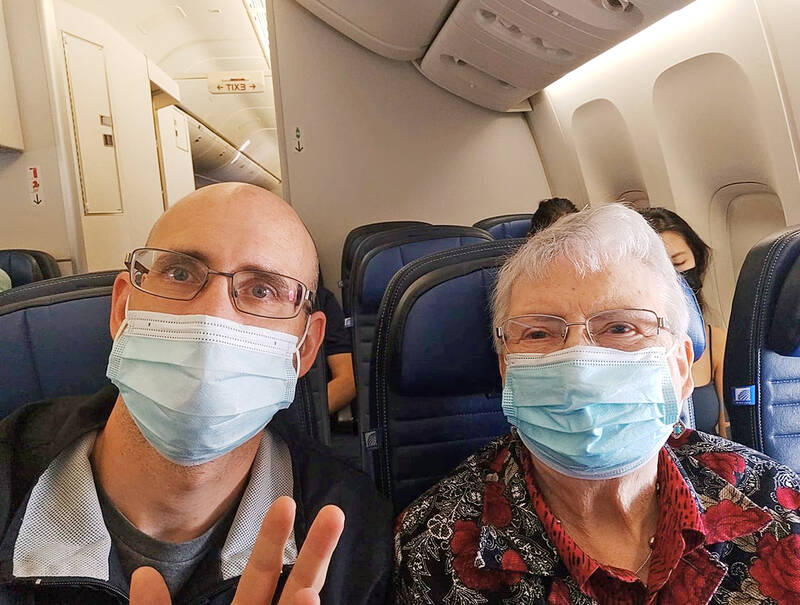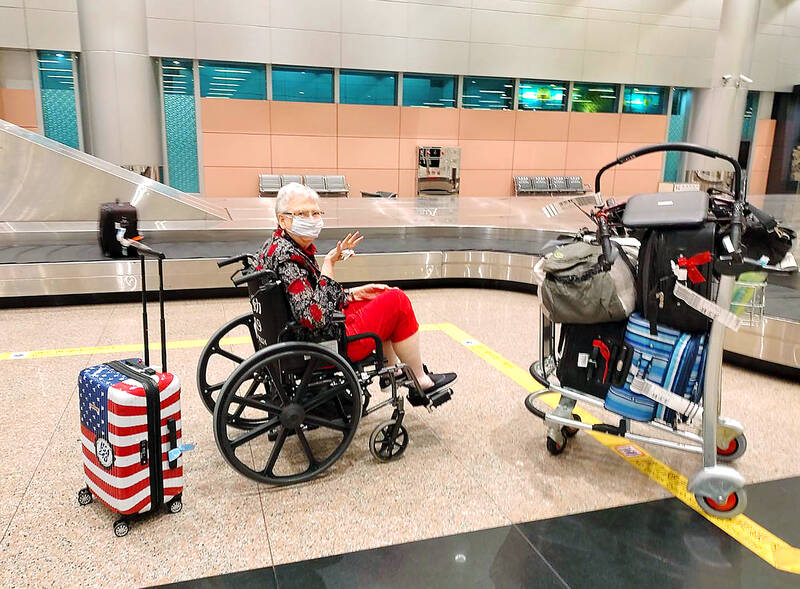When Kung Ming-hsin (龔明鑫), head of the National Development Council (NDC), announced on Aug. 30 that Taiwan aims to attract 400,000 foreigners over the next 10 years to make up for the country’s shrinking working-age population, he was perhaps hoping that some of them would be like Jason Hunter.
An American who’s been living in Tainan since mid-2013, Jason works as a specialist manufacturer, developing new products in conjunction with the company’s partners in several countries. He speaks Mandarin and Japanese, and with his Taiwanese wife, Wan-chun, he’s raising an eight-year-old boy and a six-year-old girl.
CARING FOR A LOVED ONE

Photo courtesy of Jason Hunter
Jason says he’s more than satisfied with his career trajectory, and appreciates several aspects of life in Taiwan. In recent months, however, his biggest struggle has been trying to organize satisfactory care arrangements for his mother, Carol. She’s now 79 and — Jason, his family, and his mother’s friends concluded this past summer — no longer able to live independently.
As an only child, it falls to Jason to ensure that Carol, who’s been divorced from Jason’s father for 33 years, gets the help she needs each day.
Jason explains that, of Carol’s 13 siblings, only two are still alive. Both are in their 80s, and neither live in Oklahoma, his mother’s home for the past few decades.

Photo courtesy of Jason Hunter
“When she started showing memory issues, it was clear that something needed to be done. I could see two options: Relocate my family from Taiwan to the US, and search for a job there, so I could look after my mother, or bring her to Taiwan,” he says.
After consulting relatives and others, Jason opted for the latter course of action, and not just because it saves him from having to look for a new job and spares his wife and children the stress of moving to an unfamiliar country. His children also have two healthy grandparents in Taiwan, and cousins they’re close to, he says.
Jason and his mother then set about converting her liquid assets into New Taiwan dollars, and giving or throwing away most of her belongings. When they flew over in late September, Carol brought three suitcases of clothing, electronic devices so she can stay in touch with friends and family and three months’ supply of medication.

Photo courtesy of Jason Hunter
“Our intention is to stay in Taiwan indefinitely, but right now there doesn’t seem to be a good visa solution for my mother,” Jason laments. “We’ve been told that she’s ineligible to gain permanent or temporary residency on the grounds of joining family. The best she could do was a visiting-family visa. Hers is for 60 days. It can be extended no more than twice, and it’s unlikely the authorities will extend it for more than 60 days each time,” he adds.
Reluctance on the part of Taiwan’s government to allow elderly noncitizens to settle here is understandable. The population is aging fast. Health and elder-care costs are expected to soar. The economy, everyone agrees, needs youngsters, not people on the cusp of decrepitude.
At the same time, Taiwanese traditions emphasize that grown-up children, sons especially, have a duty to care for their parents. One saying that reflects these sentiments can be translated as: “Having an old person at home is a treasure for the family” (家有一老,如有一寶).

Photo courtesy of Jason Hunter
The NDC says it recognizes this, telling this reporter in a Sept. 30 e-mail that “family is an essential element of our culture. Taiwan has a long-standing practice of supporting family reunion within our visa regime.”
According to the NDC, recent amendments to the Act for the Recruitment and Employment of Foreign Professionals (外國專業人才延攬及僱用法), “improved” provisions relating to stays by parents of Gold Card holders and Plum Blossom Card holders. The issuing of such cards is central to the government’s effort to draw highly-skilled foreign talent to Taiwan.
NEW RULES
Under the new rules, parents of noncitizens holding either type of card may apply for a multiple-entry visitor visa which allows for a stay of up to six months.
“Where there is a need to extend a stay, an application can be made to extend it for a further six months, to one year,” the NDC says. After the year is up, the parent must seek a new visa, or return home.
So far, Taiwan residency status for his mother is a door that Jason hasn’t been able to open. However, if he and Wan-chun, who became a US citizen in 2012, were living in the US, and they wanted her parents to join them there, it’d be a different story.
According to the Web site of Carl Shusterman, an immigration lawyer in Los Angeles: “Parents of US citizens [but not those of Green Card holders] who are 21 years of age or older are considered ‘immediate relatives’ and are not subject to numerical immigration quotas. Green cards for parents only take as long as needed for the paperwork to move through the bureaucracy.”
Like many expatriates, Jason has looked into applying for Taiwanese citizenship. However, having a Taiwan passport wouldn’t help him make better arrangements for his mother. According to an Oct. 25 e-mail from the National Immigration Agency, if the parents of those who’ve naturalized as Taiwan citizens are foreign nationals, and they wish to live in Taiwan, they must apply for residency or naturalization on their own merits.
RECIPROCITY?
In this sense, taxpaying permanent residents cannot protest that they’re being denied a benefit available to citizens. But the rules — for citizens or resident foreigners — can hardly be called “supportive of family reunion.” And despite the government reiterating its backing for the principle of reciprocity, Taiwan’s visa policies are highly restrictive compared with those in countries in which hundreds of thousands of Taiwanese have settled.
Citizens and permanent residents of Australia can sponsor their parents to relocate permanently to that country. Applicants must satisfy health and character requirements, and at least half of their children must reside permanently in Australia. The latter must make a legal commitment to financially support their parents. In addition to being allowed to stay in Australia indefinitely, parents who make the move may (depending what type of visa they obtain) be entitled: to coverage by the country’s publicly-funded universal health insurance scheme; to seek employment; and to eventually apply for citizenship.
New Zealand’s official immigrant Web site states: “You can apply to live in New Zealand permanently if you have a child who is a New Zealand citizen or resident. They must earn enough money and agree to sponsor you.”
Canadian immigration rules offer a route for parents and grandparents of people living in Canada to settle there. In the UK, British and Irish citizens, and others with settled status, can seek Adult Dependent Relative visas for their parents who aren’t already in the country. Citizens and permanent residents of Singapore can bring in parents on a Long-Term Visit Pass that’s valid for up to two years, after which it can be extended.
In Taiwan, because there’s no obvious route to residency status for Carol, Jason Hunter is searching for a workaround. In part two tomorrow, the Taipei Times looks into some of the solutions he’s being forced to consider, and what another American long-term resident of Taiwan had to do in similar circumstances.
Part II of this story will appear on tomorrow’s page 13.

Cheng Ching-hsiang (鄭青祥) turned a small triangle of concrete jammed between two old shops into a cool little bar called 9dimension. In front of the shop, a steampunk-like structure was welded by himself to serve as a booth where he prepares cocktails. “Yancheng used to be just old people,” he says, “but now young people are coming and creating the New Yancheng.” Around the corner, Yu Hsiu-jao (饒毓琇), opened Tiny Cafe. True to its name, it is the size of a cupboard and serves cold-brewed coffee. “Small shops are so special and have personality,” she says, “people come to Yancheng to find such treasures.” She

In July of 1995, a group of local DJs began posting an event flyer around Taipei. It was cheaply photocopied and nearly all in English, with a hand-drawn map on the back and, on the front, a big red hand print alongside one prominent line of text, “Finally… THE PARTY.” The map led to a remote floodplain in Taipei County (now New Taipei City) just across the Tamsui River from Taipei. The organizers got permission from no one. They just drove up in a blue Taiwanese pickup truck, set up a generator, two speakers, two turntables and a mixer. They

Former Chinese Nationalist Party (KMT) chairwoman Hung Hsiu-chu’s (洪秀柱) attendance at the Chinese Communist Party’s (CPP) “Chinese People’s War of Resistance Against Japanese Aggression and the World Anti-Fascist War” parade in Beijing is infuriating, embarrassing and insulting to nearly everyone in Taiwan, and Taiwan’s friends and allies. She is also ripping off bandages and pouring salt into old wounds. In the process she managed to tie both the KMT and the Democratic Progressive Party (DPP) into uncomfortable knots. The KMT continues to honor their heroic fighters, who defended China against the invading Japanese Empire, which inflicted unimaginable horrors on the

Hannah Liao (廖宸萱) recalls the harassment she experienced on dating apps, an experience that left her frightened and disgusted. “I’ve tried some voice-based dating apps,” the 30-year-old says. “Right away, some guys would say things like, ‘Wanna talk dirty?’ or ‘Wanna suck my d**k?’” she says. Liao’s story is not unique. Ministry of Health and Welfare statistics show a more than 50 percent rise in sexual assault cases related to online encounters over the past five years. In 2023 alone, women comprised 7,698 of the 9,413 reported victims. Faced with a dating landscape that can feel more predatory than promising, many in